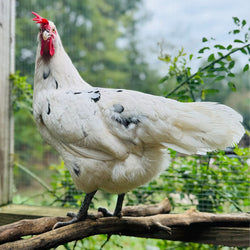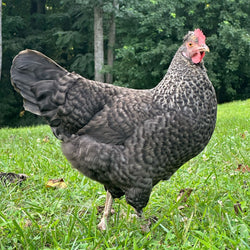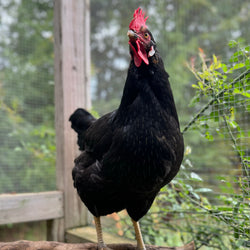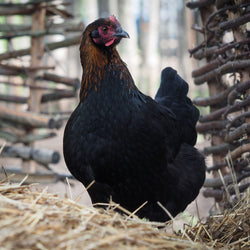f=menu&page=3/--
Frequently Asked Questions
Here we answer the most commonly-asked questions about ordering, chicken care, and more.
Do I need to clip my chickens' wings?
Wing clipping--trimming the primary feathers on your chickens' wings--is not necessary unless your flock is flying into places they shouldn't be. Most breeds do not fly particularly well, so it is not usually necessary. (Juvenile chickens will typically fly better than adults, as they have reached nearly their full wingspan at that age--but not their full weight, yet.) If you decide to clip your chickens' wing feathers for some reason, you will normally want to do that about once a year, after the molt. Some people recommend trimming the feathers of one wing only because this puts the bird off...
Read MoreMy hen laid a teeny tiny egg, and when I cracked it open, there was no yolk! Should I be concerned?
Awww, isn't that cute! Tiny, yolkless eggs are sometimes known as witch eggs or fairy eggs. Cute, huh? Occasionally a hen will lay a fairy egg when something has disturbed her reproductive cycle. Sometimes a hen will lay a fairy egg or two just as she comes into laying, before her reproductive system has gotten into gear. They do come in all the colors that hens lay: white, brown, green, blue and so on, although they are sometimes lighter or darker than her regular eggs because they may spend more or less time in the "egg painting" area of her...
Read MoreHow do I get my chickens to sleep on their roosts instead of in their nest boxes at night?
Having your chickens sleeping in their nests at night sounds like a natural thing, doesn't it? However, unless your hens are broody and hatching fertile eggs, having them sleep in the nests is a bad idea. As they sleep, they will defecate and soil the nests, and this means that when you do gather eggs, your eggs are likely to be dirty--yuck! Your flock should be sleeping on their roosts. Chickens should sleep on their roosts, NOT in nests For that reason, it can be helpful not to add nest boxes to your coop until a few weeks before your...
Read MoreHow can I help my chickens stay cool in the summer?
Chickens don't sweat like humans do to cool down. Much like dogs, they pant to help stay cool. When they are very hot, you will also see them holding their wings out slightly from their bodies and ruffling their feathers to help the heat escape. Be sure they have plenty of shade and fresh, cool water when it is hot outside. Water is extremely important! A lack of water, even for a few hours, can throw them off laying, put them at risk for heat stroke, and make it difficult for them to manage their body temperatures. But you can...
Read MoreHow can I stop my baby chicks from pecking each other in the brooder?
In most cases, you needn't worry. When you first receive them, your little chicks are hungry, and their instincts can tell them to peck at anything to see if it is good to eat: food, funny looking pine shavings, spots on the brooder walls, toes, eyes, freckles on your arm, and anything else. Once they learn what food is, they will not likely peck at anyone else unless they get stressed (too crowded, too hot, etc.), or they are establishing the pecking order. Right now you can sort-of think of them as little toddlers, "testing" everything by trying to put...
Read MoreCan I use a fan to cool the brooder down? My chicks are arriving in the heat of summer, and my brooder is in a hot room.
Baby chicks need it very warm to be comfortable--most people would call it hot. For the first week of their lives, they need temperatures of about 95 degrees Fahrenheit (and the temperature should be reduced by five degrees each week thereafter until they are acclimated to the surrounding environment). That said, they can indeed overheat if the temperature gets much above that. If you see your baby chicks panting or gasping with their beaks open like the little chick in the photo below, it is too hot in your brooder. Reduce the heat immediately, and give them a place to...
Read MoreCan unvaccinated chickens get Marek's Disease from vaccinated chickens?
The Marek's Disease vaccination is attenuated, which means, in most cases, it's not even developed using the Marek's virus. Instead, it's developed using a different illness common to turkeys, but which causes the chickens in question to develop immunity to Marek's. This is the same way the small pox vaccine was developed for humans: the vaccine is actually based on cowpox. However, cowpox provided immunity from deadly smallpox, even though you can't get smallpox from the vaccine. We know of no reports or studies showing that nonvaccinated birds can be infected with Marek's Disease by exposure to birds vaccinated for...
Read MoreHow do we make sure that our older laying hens don't eat our younger chickens' starter feed, and vice versa, since the two age groups are meant to have different feeds?
Good question! Typically, you don't want your chicks to eat layer feed since it has too much calcium for them, and you don't want your laying hens to eat too much chick starter because it lacks the calcium they need to produce strong egg shells. However, if your birds are kept in the same area, it's virtually impossible to guarantee your birds will eat the right feed (and with typical perversity, they are usually drawn to the feed you don't want them to eat!) If you have birds of different ages that may have different dietary needs, there is a...
Read More







"The Clubhouse" Coop
Easy to assemble and built to last, the Clubhouse Coop is the perfect starter coop for a small flock.











